|
|
|
Sort Order |
|
|
|
Items / Page
|
|
|
|
|
|
|
| Srl | Item |
| 1 |
ID:
119270
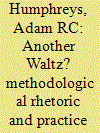

|
|
|
|
|
| Publication |
2012.
|
| Summary/Abstract |
Transnational human rights networks span the globe, and have become more numerous and influential since the 1970s. Yet we still know relatively little about the strategic interaction between transnational advocates and their targeted state actors. Focusing on such a strategic interaction, we argue that transnational advocacy is less a diffusion of authority away from state actors than a change in the ways in which the politics of accountability is conducted between sophisticated state and non-state actors. In particular, we show that targeted actors (e.g. impugned states) can develop their own discursive capacities to challenge the facts and interpretations offered by transnational advocates and 'turn the tables' on them, expanding the scope of accountability to include the conduct of NGOs themselves. Empirically, we examine the efforts made by Human Rights Watch (HRW) to make the Israel Defense Forces (IDF) accountable during the Second Lebanon War of 2006 and the Gaza war of 2008-9.
|
|
|
|
|
|
|
|
|
|
|
|
|
|
|
|
| 2 |
ID:
127803
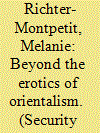

|
|
|
|
|
| Publication |
2014.
|
| Summary/Abstract |
Contrary to commonsense understandings of torture as a form of information-gathering, confessions elicited through the use of torture produce notoriously unreliable data, and most interrogation experts oppose it as a result. With a focus on the US carceral regime in the War on Terror, this article explores the social relations and structures of feelings that make torture and other seemingly ineffective and absurd carceral practices possible and desirable as technologies of security. While much of international relations scholarship has focused on the ways in which affective and material economies of Orientalism are central to representations of the 'terrorist' threat, this article connects the carceral violences in the racialized lawfare against Muslimified people and spaces to the capture and enslavement of Africans and the concomitant production of the figure of the Black body as the site of enslaveability and openness to gratuitous violence. The article further explores how these carceral security practices are not simply rooted in racial-sexual logics of Blackness, but themselves constitute key sites and technologies of gendered and sexualized race-making in this era of 'post-racial triumph' (HoSang and LaBennett, 2012: 5).
|
|
|
|
|
|
|
|
|
|
|
|
|
|
|
|
| 3 |
ID:
144094
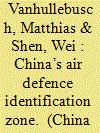

|
|
|
|
|
| Summary/Abstract |
China’s establishment of its Air Defence Identification Zone (ADIZ) is yet another manifestation on the strenuous development of regional security in East Asia. China by virtue of its so-called lawfare has instrumentalized international air law, the law of the sea, and law on the use force to reinforce its comprehensive security doctrine both on the military as well as economic front. Accordingly, China has advanced is sovereign interests through each of these branches of international law when extending its domestic laws in airspace above its Exclusive Economic Zone (EEZ), affirming its sovereignty over the disputed islands and being prepared to respond to imminent threats. Conversely, opponents of the zone have equally exploited those normative frameworks to defend their geopolitical and strategic interests in East Asia under the veil of the communitarian freedoms of overflight.
|
|
|
|
|
|
|
|
|
|
|
|
|
|
|
|
| 4 |
ID:
160938
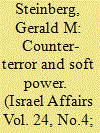

|
|
|
|
|
| Summary/Abstract |
For many years, the network of non-governmental organizations (NGOs) claiming a human rights agenda has consistently sought to delegitimise Israel’s counterterrorism strategy. This phenomenon was prominent during the 2008–2009 and 2014 Gaza wars, when these groups issued hundreds of statements condemning Israel, and in campaigns calling for UN commissions of inquiry (e.g. the Goldstone and Schabas/Davis investigations) into Israeli ‘war crimes’. NGO allegations were also the foundations of lawfare, including efforts to prosecute Israeli officials in the International Criminal Court and other venues, and for BDS campaigns against Israeli and Jewish targets. In this soft-power strategy, the perception of NGO officials as ‘security experts’ provides a major source of legitimacy, lending credence to their reports, despite the lack of credible fact-finding methodologies. Similarly, NGO legal analyses, based on problematic and aspirational interpretations, are accepted and echoed widely, without independent verification. In response, the IDF and Ministry of Defence first ignored and then sought to engage the NGOs in order to persuade them to accept Israeli perceptions and counterterror policies. When these responses failed, the emphasis shifted to countering NGO credibility in legal and diplomatic venues, which has also had limited impact to date.
|
|
|
|
|
|
|
|
|
|
|
|
|
|
|
|
| 5 |
ID:
177572
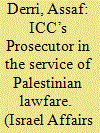

|
|
|
|
|
| Summary/Abstract |
The International Criminal Court has been recently called upon by the Court’s Prosecutor to decide a highly unusual application, to approve its jurisdiction over the State of Israel which has not acceded to its Statute. The Prosecutor asks the Court to apply to Israel a special legal standard, openly discriminating it in comparison with other states. The Prosecutor’s submission consciously deviates from established theories on the Israeli-Palestinian conflict in favour of unfounded contentions which were discussed and rejected by mainstream scholarship, supporting her tautological arguments with references to vague, unauthoritative sources. This article demonstrates that the accumulative weight of all these factors points to the conclusion that the Prosecutor’s submission constitutes in fact a sophisticated action in the service of Palestinian Lawfare against Israel rather than a bona fide legal motion. The consequences of this project, should it be endorsed by the Court, might prove devastative to international law and the present world order.
|
|
|
|
|
|
|
|
|
|
|
|
|
|
|
|
| 6 |
ID:
113987


|
|
|
|
|
| Publication |
2012.
|
| Summary/Abstract |
This article deals with the insidious propaganda campaign against the state of Israel by official and unofficial international organizations, human rights groups, the media and academic institutions, in addition to Palestinian and Arab spokespersons, to challenge the legitimacy of the Jewish state and to demonize it. The campaign is to some extent code for thinly veiled antisemitism, but it also results from a number of factors: admiration of third-worldism and disapproval of democratic systems and values, and adopting as meaningful and relevant to criticism of Israel modern post-modernist thought, cultural relativism and multiculturalism.
|
|
|
|
|
|
|
|
|
|
|
|
|
|
|
|
| 7 |
ID:
150997


|
|
|
|
|
| Summary/Abstract |
The contentious concept of ‘lawfare’ has proliferated to various foreign policy areas and permeated a discourse on the function and legitimacy of law in conflict. The concept seems particularly apt to the International Criminal Court’s (ICC) judicial interventions. In this context, I define lawfare as the coercive and strategic element of international criminal justice in which the ICC’s judicial interventions are used as a tool of lawfare for States Parties and the United Nations Security Council to pursue political ends. I argue that there are two types of political ends being pursued with this lawfare: conflict resolution and politicized prosecutions. First, the ICC’s spokespersons, advocates, and supporting states have cultivated a discourse that justice is a means to peace. As a result, the ICC has been used as a means of intervention in ongoing conflicts with the expectation that the indictments, arrests, and trials of elite perpetrators have deterrence and preventive effects for atrocity crimes. Despite these legitimate intentions and great expectations, there is little evidence of the efficacy of justice as a means to peace. Second, the other manifestation of lawfare represents an abuse or manipulation of the ICC for political gain. Specifically, States Parties have strategically referred their conflict situations to the ICC with the expectation that the referral will result in the removal of their rivals and sanction the impunity of ruling elites. This politicization of international justice has been successful in that most of the ICC’s prosecutions are unjustly one sided. Evidence of politicized prosecutions has damaged the ICC’s credibility as an impartial institution and raises questions about the desirability of state referrals. Consequently, the ICC’s efficacy and credibility are suffering from lawfare.
|
|
|
|
|
|
|
|
|
|
|
|
|
|
|
|
| 8 |
ID:
157746
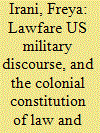

|
|
|
|
|
| Summary/Abstract |
In this article, I aim to reorient debates, in International Relations and Law, about the relationship between law and war. In the last decade, writers have challenged common understandings of law as a limit on, or moderator of, warfare. They have instead claimed that law is often used as a ‘weapon of warfare’, describing such uses as ‘lawfare’. Below, rather than arguing that law is either a constraint on or an enabler of warfare, I examine how law comes to be represented as such. Specifically, I examine representations, primarily by US military and other governmental lawyers, of ‘non-Western’ invocations of the laws of war, which seek to constrain the policies or practices of the US or Israeli governments. I show how these authors cast such invocations as not law at all, but as tools of war. I suggest that this move rests on, and reproduces, colonial discourses of ‘non-Western’ legal inadequacy or excess, which serve to render ‘non-Western’ law ‘violent’ or ‘war-like’. I show that the referents and boundaries of law and war are stabilised by notions of civilisational difference, which serve to give meaning to what law is, what war is, and whether particular claims or practices are understood as martial or legal.
|
|
|
|
|
|
|
|
|
|
|
|
|
|
|
|
| 9 |
ID:
096582
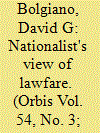

|
|
|
|
|
| Publication |
2010.
|
| Summary/Abstract |
Many lawyers, military legalists, scholars, and policymakers continue to march the United States down the road to full membership in the International Criminal Court (ICC). This article explores the darker side of such a trek, from both legal and strategy perspectives, by examining three important fracture points that make joining the ICC irreconcilable with our Constitutionally-based republican form of government: Constitutionally protected individual rights; the American legal notion of the individual right of self-defense, and the influence of Sharia law.
|
|
|
|
|
|
|
|
|
|
|
|
|
|
|
|
| 10 |
ID:
153884
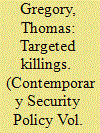

|
|
|
|
|
| Summary/Abstract |
The use of drones to kill suspected militants seems to provide a simple technical fix to a complex ethico-political problem: the need to discriminate between combatants and noncombatants. The technological ability of drones, combined with the rhetorical commitment to reducing civilian casualties, suggests that the principle of noncombatant immunity is firmly entrenched in debates about targeted killings. However, this article will argue that a peculiar effect of this enhanced technological capability has been to draw attention to the conceptual confusion that surrounds the distinction. Rather than assuming that it is a fixed feature of international law, I will argue that it should be viewed as a discursive formation that is contingent upon a precarious process of repetition and reiteration. Moreover, I will show how the laws designed to restrain the violence inflicted on civilian bodies have been invoked to render certain civilians vulnerable, constituting them as killable, their lives profoundly losable.
|
|
|
|
|
|
|
|
|
|
|
|
|
|
|
|
| 11 |
ID:
158144


|
|
|
|
|
| Summary/Abstract |
Efforts to isolate and delegitimise nations pose a growing danger to state security. The components used in such efforts are, however, not fully understood. This article expands upon existing research by proposing that there are seven areas in which states can face isolation efforts: political, economic, military, sociocultural, media, lawfare, and religious. Moreover, it proposes the idea of ‘destruction-oriented’ isolation, which aims to destroy a state, not merely create change. The ongoing campaign against Israel serves as the case study. Gaining a better understanding of these different tools will allow states to better prepare themselves to withstand these threats.
|
|
|
|
|
|
|
|
|
|
|
|
|
|
|
|
|
|
|
|
|